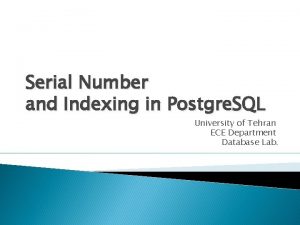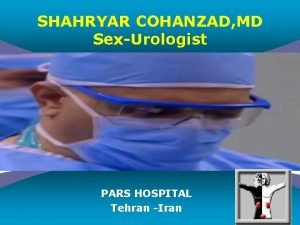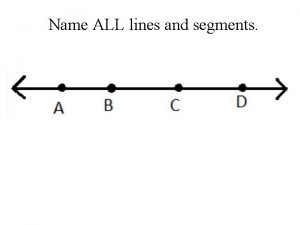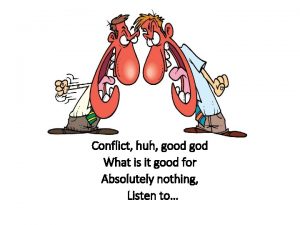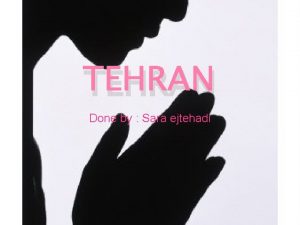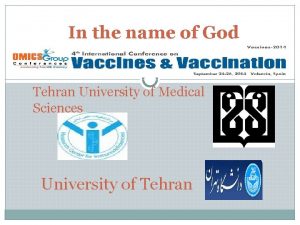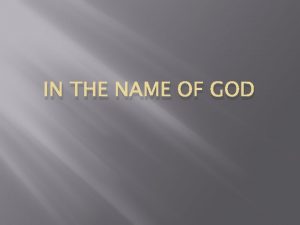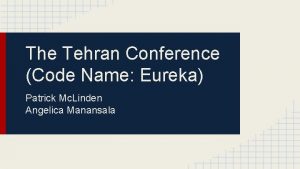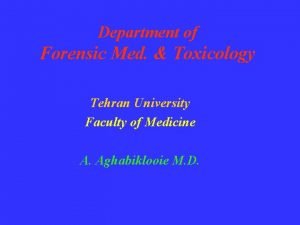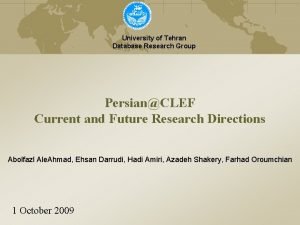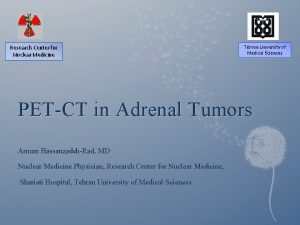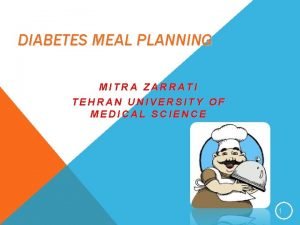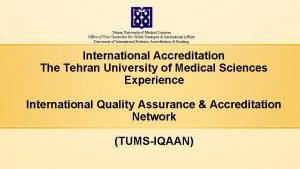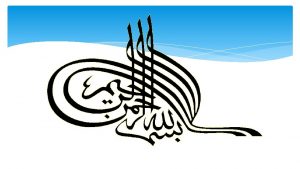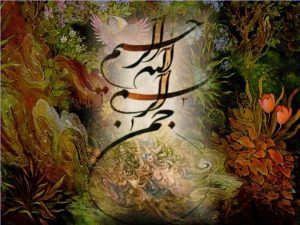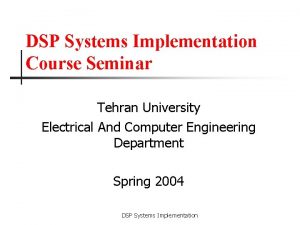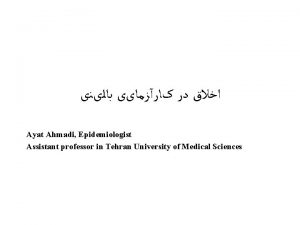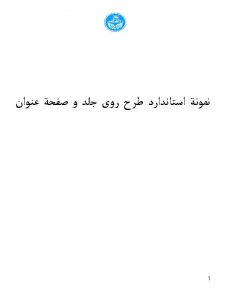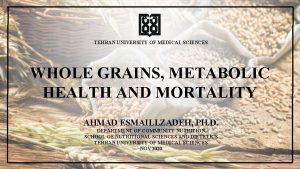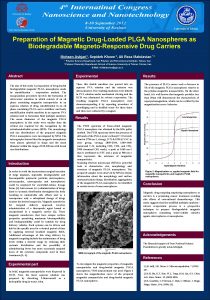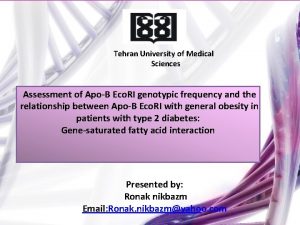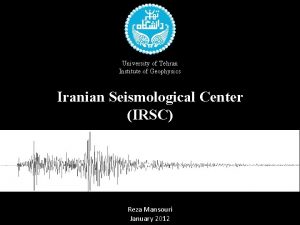In the name of God Tehran University of





















































- Slides: 53

In the name of God Tehran University of Medical Sciences University of Tehran

TH 1, Th 2 serum cytokines and spleen white pulp changes against preliminary L. major vaccine injection and challenge with live L. major promastigotes in Balb /c mice. Latifynia A. *1, ², Gharagozlou M. J³ Mohebali M 4, Hajaran H 4 Khansari N¹, � � � � 1 Department of Immunology, Faculty of Medicine, Tehran University of Medical Sciences, Tehran, Islamic Republic of Iran. 2 Department of Pathobiology, Faculty of Veterinary Medicine, University of Tehran, Islamic Republic of Iran. ³ Leprosy and Dermal disease Center, Tehran University of Medical Sciences, Tehran, Islamic Republic of Iran.

Promastigotes of Leishmania major, 10× 100, Giemsa stain.

Leishmaniasis life cycle

Cutaneous Leishmaniasis Sore(human)

Cutaneous Leishmaniasis Sore(dog)

Amastigotes of Leishmania major within macrophges, 4× 100, H&E staining method(cutaneous lesion).

Diagnosis � L. major should be considered chronic lesions in endemic area � similar lesions : paracoccidiodomycosis, histoplasmosis, sporotrichosis, lobomycosis, lupus vulgaris, Mycobacterium ulcerans, syphilis, cutaneous sarcoidosis, and leprosy should all be considered as well � Identify amastigotes in a Wright-Giemsa-stained touch preparation or through isolation of the parasites in cultures.

Materials and Methods �: � One hundred and twenty young adult female and male Balb/c mice � Culture and Isolation of Leishmania Parasites: Leishmania promastigotes of L. major (WHO) strain were provided by the Tehran University of Medical Sciences � were grown in NNN medium and RPMI 1640 supplemented with 5% - 10%FCS � Harvested parasites were washed three times with normal saline solution (0. 9%) or PBS. � counted in a Neubar chamber and kept at -70°c until use. accumulated parasites diluted to a concentration of 5. 92× 10¹º �

Materials and Methods � Vaccine Preparation � suspended 5. 92× 10¹º parasite was divided into 5 batches � procedure compsed of: freeze and thaw, autoclave, or inactivation at 56°C � At least antigen processed � each vaccine was adminstered at 100 or 200 μg/0. 1 m. L Leishmania protein per dose � content of protein in each dose was estimated by the Lowry method

Materials and Methods � Vaccine � The Preparation content of protein in each dose was estimated by the Lowry method � two injection doses (100, 200 μg/m. L) were prepared � The vaccine was stored at 4°C until use � Just before injection, 2× 105 CFU live BCG /0. 1 ml or 400 mg/0. 1 ml alcoholic extract of Teucrium polium dissolved in 1 ml distilled water and 2. 5 mg/0. 1 ml of used for each injection dosage solution (100, 200 μg/ml).

Materials and Methods � � � Injection Groups LT received 100 -200 µg /0. 1 ml of the crude cocktail antigen plus alcoholic extract of Teucrium polium as adjuvant LB received 100 -200 µg /0. 1 ml of the crude cocktail antigen preparation plus BCG as adjuvant LBT received 100 -200 µg/0. 1 ml of the same antigen preparation plus alcoholic extract of Teucrium polium and BCG as adjuvant Control had not any received antigen. Groups LT, LB and LBT were injected subcutaneously and were boosted two times with a weeks interval. Challenge A week after the last booster, all animals including were challenged with 3× 105/0. 1 ml live Leishmania major promastigotes. Protectivity The protective response was evaluated for 70 days. Evaluation parameters was composed of : lesion induction , and rates of survival.



Materials and Met animals survived hods � Cytokine � The assay serum of the survived animals was used for cytokine levels � Levels of IL-4, IL-10, IL-12, and IFN-γ in the three injection groups and normal group were determined by sandwich ELISA and an automated micro plate reader, set at 405 nm, according to the recommendations of manufacturer � The sensitivity limit was 20 picogram /ml for IL-4, IL-10, and IFN-γ.

Materials and Methods � � White Pulp Size Assay the animals survived of post challenging were euthanized using diethyl- ether, necropsied and spleen was removed and fixed in 10% buffered formaldehyde solution. The fixed spleen tissues were processed in a tissue processor, paraffin blocks were made and 4 -5 microns tissue sections were prepared and stained with Harris Hematoxyline and Eosine method. The expansion rate of the spleen white pulp size was evaluated using a light microscope with eyepiece graticule. Statistical Analysis Data obtained from the experiment were analyzed using SPSS (SPSS Inc. , Chicago, IL, USA). Means were compared by a standard analysis of variance/ simple factorial tests, and by one and two way, student Newman –Keuls methods. Correlation coefficient analysis was determined on a Pearson average (two tailed test) is significant. The study was done in compliance with the Helsinki Declaration, and the protocol was approved by research deputy of Tehran University of Medical Sciences, Tehran, Iran. �

Results IL-12: � � Highest amounts of IL-12 (2305. 5 pg/ml) related to the LBT group and lowest of IL-12 (1032 and 1037 pg/ml) was related to the LT and LB groups which are almost equal. IL-12 was higher in female (2091 pg/ml) than male mice (611. 08 pg/ml) (table 1). The ANOVA test between injection groups, Th 1 cytokines (IL-12, IFN -γ) , Th 2 cytokines (IL-4, IL-10)in both doses of 100 and 200 μg/0. 1 ml. showed that means square of IL-12 between groups and compared to other Th 1, Th 2 cytokines is significant (p<0. 005). Pearson Correlation with the 2 - tailed test shows that IL-12 and IL 10 had inverse relationship and any time IL-12 increased IL-10 decreased also and Vice versa (Table 3).

Results � SWP � In & IL-12 correlation this study showed that correlation between level of IL-12 expression and increasing of SWPs is straight linear (positive) which show when the white pulp increased, IL 12 increased also. (This relation is good and Pearson Coefficient is 0. 582, which is very strong � its Coefficients of Determination is 0. 34, which relatively is strong. Correlation 2 -tailed is significant (P< 0. 05) and this suggests that in 99. 8% of cases this conclusion is true and significant (table 4)

Results � IL-10: Highest level of IL-10 (27. 2 pg/ml) related to LB and lowest concentration belonged to LBT group (19. 39 pg/ml). This is almost equal to the normal group’s level, but the LT group was higher than the LBT group and also lower than LB group. � in male (25. 27 pg/ml) was higher than female mice (23. 67 pg/ml) (table 1, 2). � Correlation between IL-10 and IL-12 at doses 100 & 200 μg/0. 1 ml was significant (p<0. 005 and Pearson Correlation with the 2 - tailed test showed that IL-12 and IL-10 had inverse relationship which any time IL-12 increased Il-10 decreased and Vice versa (Table 3). �

Results � SWP & IL-10 correlation � correlation between level of IL-10 expression and increasing of SWPs was Inverse linear (negative), also, which show when the white pulp increased; IL 10 decreased, and vice versa. But this relation is weak and Pearson Coefficient is -0. 351, which is moderate, � its Coefficients of Determination is 0. 12. Correlation 2 -tailed is not significant (P< 0. 085) and this suggests although 0. 085 is greater than critical number 0. 05, but this difference was very small and only 0. 3 larger than ofo. 5, which is near to significant(table 4).

Results � IL-4: Highest IL-4 (25. 52 pg/ml) related to the LT and lowest IL-4 (17. 52 pg/ml) to the LBT and LB groups. These two groups were equal and normal group also. � IL-4 in male (23. 99 pg/ml) was higher than female mice (21. 7 pg/ml). IL-4 was not significant at the 0. 05 level (2 -tailed) (Table 1, 2). � Correlation between injection groups and Th 1 cytokines (IL-12, IFN-γ and Th 2 cytokines (IL-4, IL-10) and combined doses (100 and 200 μg/0. 1 ml) and ANOVA test showed that means square of IL-4 between groups compared other Th 1, Th 2 cytokines was not significant (Table 3). �

Results � SWP & IL-4 correlation Correlation between level of IL-4 expression and increasing of SWPs is Inverse linear (negative) which show when the white pulp increased, IL-4 decreased. On the contrary, SWPs decreased, when the IL-4 increase. This relation was weak, � Pearson Coefficient -0. 021, which was moderate, and its Coefficients of Determination was 0. 001. Correlation was not significant (P=0. 919) but greater than critical number (0. 05) (table 4). �

Results � � � IFN-γ: The LB group had highest level (35. 4 pg /ml) and 27. 2 pg/ml of IFN-γ related to the LT and also lowest concentration belonged to the LBT group (19. 39 pg/ml). IFN-γ in male (32 pg/ml) was higher than female mice (26. 23 pg/ml) (table 1). IFN- γ was not significant with 0. 05 level (2 -tailed) (Table 2). Correlation between injection groups and Th 1 cytokines (IL 12, IFN-γ) and Th 2 cytokines (IL-4, IL-10) with combined doses (100 and 200 μg/0. 1 ml) showed that three injection and normal groups’, considering IL-12 and Multiple Comparisons of IL-12 with Tukey HSD with 95% Confidence by mean difference was significant at the 0. 05 level. ANOVA test also showed that means square of IFN-γ between groups and compared to the other Th 1, Th 2 cytokines was not significant (Table 3).

Results � SWP & IFN-γ correlation � Correlation between level of IFN-γ expression and increasing of SWPs is Inverse linear (negative) which show when the SWPs increased, IFN Ƴ decreased. On the contrary, when SWPs was decreased, IFN Ƴ increase. Pearson Coefficients for this relation was weak (-0. 173) and Coefficient of determination was 0. 03, which showed week relation. � Correlation of 2 -tailed was not significant (P=0. 409) and this was very greater than critical number (0. 05). This difference was great and the correlation is not significant (Table 4).

Spleen White Pulp size-Normal Balb/c × 3. 5

Group LB. dose 100 Balb/c × 3. 5

Table 1 : Th 1 and Th 2 serum cytokines levels and spleen white pulp sizes (SWPs) in the control and vaccinated groups of Balb/c mice after challenging with live L. major promastigot Group sex IFNγmin(pg/ml) IL-12 min(pg/ml) IL-4 min(pg/ml) IL-10 min(pg/ml) SWPs min(μm) LT F M T 31. 2(23. 1 -39. 1) 33. 8(27. 5 -45. 6) 33. 03(23. 145. 6)a 710(326 -1864) 21185(326 -4000) a 293(668 -4000) 17. 9(13. 9 -21. 8) 21. 1(13. 9 -34. 1) a 18. 4(20. 8 -34. 1) 23. 5(18 -26. 5) 16. 2(13. 6 -18) 21. 1(13. 6 -26. 5) a 573. 8(308 -657. 5 503. 2(392. 7 -8. 6. 97) 524. 16(308 -806. 96)b LB F M T 30. 2(26. 5 -34. 9) 30. 5 30. 2(26. 5 -34. 9)a 1364(307 -3032) 55 1102(55 -3032)a 17. 5(14. 2 -19. 9) 19. 9 17. 6(14. 2 -19. 9)b 21. 5(17. 2 -27) 27 22. 7(17. 2 -27)a 620. 5(565. 72 -699. 2) 588 614(565. 72 -699. 2)b LBT F M T 25. 5(12. 6 -34. 4) ND 25. 5(12. 634. 4)b 3098(1828 -4094) b ND 3098(1828 -4094) b 18. 4(17. 1 -18. 9) ND 18. 4(17. 1 -18. 9)b 18. 8(13. 6 -26) ND 18. 8(13. 6 -26)a 914. 3(623. 4 -1016. 5) ND 914. 3(623. 4 -1016. 5) a Control F M T 26. 7(23. 8 -29. 4) ND 504. 1(460. 9672. 9) b 2709(864 -3686) ND 2709(864 -3686)c 19. 2(14. 2 -27. 5)a ND 26. 7(23. 8 -29. 4)b 17. 8(14. 7 -22. 7) ND 19. 2(14. 2 -27. 5)a 504. 1(460. 9 -672. 9) ND 17. 8(14. 7 -22. 7)a F: Female M: Male T: Total SWPs: Spleen White Pulp size min : ( Min-Max)/2 a-c Means within a column with no common superscripts are significantly different (P<0. 005)

Table 2: A statistically comparison between the SWPS expansion rates of the groups LT, LB and LBT and control challenged with live L. major promastigotes. Between Groups Within Groups Total Sum of Squares df Mean Square F Sig. 639993. 436 3 213331. 145 7. 362 . 001 21 28978. 029 608538. 611 1248532. 047 24

Table 3: ANOVA test show that means square of IL-12 between groups and compare to other Th 1, Th 2 cytokines is significant. ANOVA IFN-γ Levels Sum of Squares Between Groups Within Groups Total Mean Square F Sig. 3 32. 849 . 812 . 497 1295. 035 1393. 583 32 35 40. 470 . 651 . 008 98. 548 df IL-12 Levels Between Groups 1. 696 E 7 3 5653365. 43812 Within Groups Total 3. 890 E 7 5. 586 E 7 32 35 15595. 185 IL-10 Levels Between Groups 263. 395 1809. 174 2072. 569 3 32 35 87. 798 56. 537 1. 553 . 220 IL-10 Levels Between Groups 487. 502 4308. 083 4795. 586 3 32 35 162. 501 134. 628 1. 207 . 323 Within Groups Total

Table-4: Correlation between IL-12 and IL-10, IL-4, IFNγ on Doses 100 and 200 μg / 0. 1 ml combined with together. Pearson Correlation with 2 - tailed test show that IL-2 and IL-10 have reversed with together and when IL-12 is increased Il-10 decreased. Correlation is significant at the 0. 05 levels (2 -tailed) and also correlation between IL-12, IL 10, Il-4, IFN-γ and SWPs expansion at doses 100 and 200 μg / 0. 1 ml Pearson Correlation with 2 - tailed test show that IL-12 and SWPs expansion is direct and when IL-12 is increased SWPs expansion is increased also. Correlation is significant at the 0. 05 level (2 -tailed). ** is significant, UD is Undetermined, Correlation SWPS(microm IL 12 Levels Il-10 levels Il-4 levels IFN-γ SWPs min(μm) IL 12 min(pg/ml ) IL 10 min(pg/ml ) IL 4 min(pg/ml) IFNγmin(pg/ml ) s eter) Pearson Correlation Sig. (2 -tailed) N 1 . 582** -. 351 -. 021 -. 173 25 . 002 25 . 085 25 . 919 25 . 409 25 25 Pearson Correlation Sig. (2 -tailed) N . 582** 1 -. 342* . 002 25 36 . 041 36 UD UD Pearson Correlation Sig. (2 -tailed) N . 351 -. 342* 1 . 085 25 . 041 36 36 UD UD Pearson Correlation Sig. (2 -tailed) N -. 021 1 UD Pearson Correlation Sig. (2 -tailed) N -. 173 . 919 25 . 409 25 levelsg/ml) UD UD 36

Discussion � Higher survival rate was seen in LT group which received the antigen preparation plus the alcoholic extract of T. polium followed by live L. major challenge. � Comparing, four groups of LT, LBT and control, the lower survival rate was seen in control group challenged by live L. major promastigots. � Higher white pulp size in the LBT group indicated induction of humoral immunity which it may not protect the animals against leishmania infection or progression. � this antigen preparation also could induce cell mediated immunity which it seems to be a protective response as shown in previous studies. (41)

Discussion(continued) �LB � � � group has the highest level of IFN-γ (35. 4 pg/ml), whether (27. 2 pg/ml) related to the LT is lowest which belong to the LBT group (19. 39 pg/ml). Male mice had higher IFNγ (32 pg/m. L) than female (26. 23 pg/ml). The resistance to leishmania conferred by T-helper type-1 (Th 1) cells while the susceptibility is conferred by Th 2 cells. Th 1 cells secret IL 12 and IFN- γ where as Th 2 cells secret IL- 4, IL-5 and IL-10. It has been shown that IFN- γ activates macrophages to express i. NOS 2, the enzyme catalyzing the formation of nitric oxide; nitric oxide kills the intracellular amastigotes. In contrast, Th 2 immune response limits the action of Th 1 functions via IL-10 and IL-4, which deactivate macrophages helping intracellular parasite growth and disease progression (42). Ldp 23 is a powerful and selective activator of Th 1 cytokines by mouse cells (41).

Discussion(continued) � C 57 BL/6, CBA/J, C 3 H, B 10 D 2) are resistant to infection with leishmania major. Upon intra dermal /sub-cutaneous injection with L. major, these animals develop a small lesion that subsides within 6 -8 weeks. � By contrast, BALB/c mice are highly susceptible to infection with these organisms (4, 5). These mice fail to control the infection and develop extensive lesions. The parasites metastasize to the internal Viscera (primarily liver, spleen, and bone marrow), an event that may lead to the animal’s death(7). � resistance and susceptibility with the emergence of the two phenotypically distinct subsets of CD 4+T cells, namely T helper cell type I (Th 1) and type 2 (Th 2) cells, during the disease process. Upon infection with L. major mice of the resistant phenotype clearly develop a dominant a Th 1 phenotype of immune response to the parasite’s antigens.

Discussionc(continued) � Based on these results, we can say, our findings about this preliminary vaccine that showed most expression of IL-12 in survival LBT group 70 days Post challenging, and conversely, lowest expression of IL 10 in survival LBT group 70 days Post challenging, and also increasing IFN γ expression in almost all 3 injection groups, and finally IL 4 little increasing only in LT group. Our results almost confirmed other experiments results which mentioned above. In several systems have been used to correlate resistance/susceptibility with Th 1/Th 2 response but perhaps the most compelling one is that involving mice genetically deficient in either interferon-γ (IFN- γ ) or interleukin 4(IL-4), the phenotypic surrogates of Th 1 and Th 2 CD 4+ T cell responses, respectively (7). The results of other researches finally shifted focus from IL-4 to IL-10 as a susceptibly factor (21). Recently it has been shown that IL-10 plays a suppressive or regulatory role in autoimmune diseases (24), host versus graft rejection (25), and parasitic infection (26, 27). Administration of anti. IL-10 antibodies during L. major infection reduced the susceptibility of IL-4 receptor α gene deficient mice (28). It has been shown that IL-10 dictates the susceptibility to L. donovani infection (29, 30) and is required for higher parasite persistence in both resistant C 57 BL/6 and susceptible BALB/c mice (31, 32).

Discussion(continued) � Most of the vaccines target the host DCs with adjutants, such as Bacillus Calmette Guerin (BCG), , or, more recently , with non methylated Cp. G oligo deoxy nucleotides, which mimic nucleotide sequences common to bacterial DNA (18, 19). � Other adjuvant strategies being developed include the administration of Th 1 promoting cytokines, such as IL-12, within the vaccine. � In our previous research white pulp statue showed the lowest increasing size in the resistant mice and injection � group I that received 100 μg of the antigen, pre challenge. The same result was found in; mice type 1 and group I that injected with 200 μg of antigen. Correlation of DTH 24 h and 48 h showed when SLT (24 hrs) increasing, SLT (48 hrs) increased too. � Correlation of DTH at 24 hrs post inoculation (PI) and 48 hrs PI with percentage of SWPF size expansion is reversed and linear (-0. 0797), that is near to (-1. 0). There is a correlation between groups injected with antigen plus BCG and PPD skin test reversed and linear (-0. 0797), that is near to (-1. 0) susceptible (type 1) and resistant (type 2).

Discussion(continued) � Our previous results indicated that the DTH responses and spleen white pulp statue differed significantly when mice type 1 and 2. Comparing with groups I, II and III results showed a statistically significant difference among groups in an antigen dependent manner. The higher DTH responses and lower spleen white pulp size were noticed in animals that had received 100 or 200 μg of the antigen with a single booster either in mice type 1 or 2. Previous studies show that CD 4+ Th 1 and Th 2 regulate infection development. When L. major causes a single cutaneous lesion, or undergo spontaneous cure, subject is resistant and probably infection is inhibited in macrophage via innate immunity and production of interferon gamma and IL 12 by Th 1 response that lead to parasite killing, and probably in future challenge subject is immune. Scott et al suggested that low antigen doses may preferably promote a CD 4+ Th 2 response in vivo, where as high doses may favor Th 1 cells develop (13).

Discussion(continued) � The higher DTH responses and lower spleen white pulp size were noticed in animals that had received 100 or 200 μg of antigen with a single booster either in mice type 1 or 2(13). The injection of purified Leishmania subunit proteins, conferred protection in the mouse model of leishmanasis against subsequent challenges, but such vaccines seems to require continuous boosters and presence of immune adjuvant. Understanding how antigen dose influences the development of Th 1 and Th 2 cells is important for designing vaccines and until the time of being, experiments that have addressed this issue have had conflicting results. � Our previous studies include two types of mice: susceptible (type 1) and resistant (type 2), and five injection doses of antigen (100, 200, 300, 400, 500 μg /0. 1 ml) and three injection groups: group I (Leismania plus the same dose booster) group, group II (Leismania plus BCG), and group III (Leismania plus BCG plus the same dose booster).

Discussion(continued) �Spleen is a lymphoid organ of the secondary lymphatic system that contains two types of tissues, red pulp and white pulp. The white pulp is the place where immune response is induce that subsequently antibody production. Upon antigenic challenge, these primary follicles develop into characteristic secondary follicles containing germinal centers, where rapidly dividing B cells (centroblasts) and plasma cells are surrounded by dense clusters of concentrically arranged lymphocytes(45). � � NKT cells should be considered both when treating active Leishmania infection as well as in the development of vaccines. Recent progress in understanding how the innate immune system recognizes microbial stimuli and regulates adaptive immunity is being applied to vaccine discovery in what is termed “systems vaccinology” (47).

Discussion(continued) � � � Several versions of a Gal. Cer and other glycolipids have been synthetically generated and vary in terms of cytokine responses, is favor more of a Th-1 or Th-2 response (49, 50). Multi copy genes are often preferred to enhance sensitivity, and thus are beneficial for detection, but due to potential variations and instability in copy number of the same gene both between and within species (51). Systems vaccinology is one shoot out systems biology for which tools of a number of high- through put technologies including DNA microarrays, RNA-seq. , protein arrays, deep sequencing, and mass spectrometry along with sophisticated computational tools have been originally developed (52 -27). The role of IL-10 in promoting pathology of VL has long been demonstrated in human studies. It must be noted that in several of the heat killed Leishmania vaccines, BCG was a common adjuvant and the immune reaction caused by BCG compounded the LST-based interpretation significantly. A meta- analysis further confirmed that LST conversion maybe associated with an immune response that can provide some protection by its ability to distinguish as a population of responders to leishmanial antigen or BCG after vaccination even though such response had a huge variability (16– 68%conversion rate) in these studies (53).

Discussion(continued) � � An important finding in our previous study is that, lower expansion of SWPs and highest increasing in DTH was seen in groups received 100 and 200 μg antigen. These findings may indicate that in the resistant animal and human subjects the infection will be probably resolved in the macrophage via innate immunity and production of interferon gamma and IL 12 by Th 1 response that lead to parasite inhibition which in turn it confer immunity to future challenge (12). In author previous published results show that group I that received 100 μg/0. 1 ml and 200 μg/0. 1 ml antigen had high DTH for SLT and low SWPs increasing, while low DTH and high SWPs was seen in group II, III that received 400 μg/0. 1 ml and 500 μg/0. 1 ml antigen which lead to high dose and low dose concepts that proposed by Uzonna et al in 2004.

� In Discussion(continued) present research also, highest SWPs was related to LBT group and lowest SWPs was also to LT group however, LB group had SWPs greater than LT group and less than LBL group. Leishmania vaccine development has proven to be a difficult and challenging task, which is mostly hampered by inadequate knowledge of parasite pathogenesis and the complex of immune responses needed for protection (13). � Regard to all of the Th 1& Th 2 cytokines and SWPs expansion results in this study which new vaccine could had induce Th 1 pattern expression (IFN γ, IL-12), and prevent of Th 2 (IL-10, IL-4) pattern induction , and effect on spleen and SWPs which had adverse or direct effect with same injection doses and diverse injection groups(author previous experiments (9, 12, 13, 41&44)

Discussion(continued) � � � � � The present confirmed other scientist findings. Regard to our results following suggestion could be presented at this stage of my study: 1 - preliminary vaccine used in this study could have been induced protective effect after vaccination and against re exposure with live leishmania, in Blab/c mice. 2 -IL-10 expression has lowest level in LBT group and, down regulation for IL 10 and up regulation of IL 12 for LBT group were seen post challenging. 3 -IL-4 expression influence could regulate the preliminary Vaccine protective effects, in this regard the LT group had highest IL-4 expression. 4 - This new vaccine could induce Th 1 pattern which could increase survival rates in a number of mice after 70 days. 5 -This new vaccine induce Th 1 pattern and could increase SWPs and prevent induction of Th 2 cytokines pattern in LBT group. 6 - LT group has lowest level of SWPs and reasonable level of IL 12, but, the level is lower than LBT group, IL-10 less in LT group is less than LB group but more than LBT. 7 - LT group had reasonable levels of serum IL-4 and IFN-γ

Discussion(continued) � And while we do not know: whether SWPs is the site to create and induce humoral antibody, � The serum levels of leishmania antibody in the LBT group. whether LBT is a good inducer of antibody induce and cytokines, and alsowhether the LT group is a bad inducer of antibody and a good inducer of protective cytokines. � Since most of the survived mice are in LT group, it can be imagined that the group received antigen plus alcoholic extract of T. polium produced a protective cytokines profiles or network which contained the organism at the site of enry. � And we know that the BCG could have a side effect especially in MSMD patients. �

suggestions � Most important suggestions are; � 1 - Additional studies should be conducted on animal models towards final process of phase I clinical trial of this preliminary leishmania major vaccine in the future. Furthermore, we are planning to measure IL 23 and IL 17 expression, after adminstration of new leishmania vaccine folllowed by challenging with live leishmania major in the future. � 2 - In this regard the rate of antibody production (Ig. M, Ig. G) will be conducted.

References: � � � � 1 -Awasthi A, Kumar Mathur R , Saha B (2004). Immune response to leishmania infection. Indian J Med Res 119: 238 -258. 2 -Oryan A, Mehrabani D, Owji S. M, Motazedian M. H , Asgari Q (2007) Hostopathologic and electron microscopic characterization of cutaneous leishmaniasis in Tatera indica and Gerbillus spp. infected with leishmania major. Comp Clin Pathol 16 : 275 -279. 3 – Skeiky Y. A, Kennedy M, Kaufman D. , et al. (1998). Le. IF : a recombinant Leishmania protein that induces an IL-12 –mediated Th 1 cytokine profile. J. Immunol. 161 : 6171 -6179. 4 - Berberich. C, Ramirez-Pineda J. R, Hambrecht Cet al. (2003) Dendritic cell (DC)based protection against an intracellular pathogen is dependent upon DC-derived IL-12 and can be induced by molecularly defined antigens. J. Immunol 170: 31713179. 5 - Coler. R. N, Skeiky Y. A, Bernards k, et al. (2002) Immunization with a polyprotein vaccine consisting of the T-cell antigens thiolspecific antioxidant, Leishmania major stress –inducible protein 1, and Leishmania elongation initiation factor protects against leishmaniasis. Infect. Immunol 70: 4215 -4225. 6 - Handman. E (2001). Leishmaniasis: current status of vaccine development. Cli. Microbiol. Rev 14: 229 -243. 7 -Manickasingham. S. P, Edvards A. D, Schulz O, Reis E Sousa C (2003) The ability of murine dendritic cell subsets to direct T helper cell differentiation is dependent on microbial signals. Eur. J. Immunol 33: 101 -107.

References: � � � � 8– Skeiky Y. A, Kennedy M, Kaufman D, et al. (1998) Le. IF : a recombinant Leishmania protein that induces an IL-12 –mediated Th 1 cytokine profile. J. Immunol. 161 : 61716179. 9 - Handman E (2001) Leishmaniasis: current status of vaccine development Cli. Microbiol. Rev 14: 229 -243. 10 - Kane MM, Mosser DM (2001). The role of IL-10 in promoting disease progression in leishmaniasis. Journal of Immunology. 166: 141 -1147. 11 -Belkaid y, Piccirillo C, A, Mendez S, Shevach E. M , Sacks DL (2002) CD 4+CD 25+regulatory T cells control leishmania major persistence and immunity. Nature 420 : 502 -507. 12 - Belkaid Y, Hoffmann KF, Mendez S, Kamhavwi S, Udey MC, Wynn TA , Sacks DL (2001) The role of IL-10 in the persistence of leishmania major in the skin after healing and therapeutic potential of anti IL-10 receptor antibody for sterile cure. Journal of experimental Medicine 194: 1497 -1506. 13 -Campos-Neto A, (2005) What about Th 1/Th 2 in cutaneous leishmaniasis vaccine discovery? Brazilian Journal of Medical and Biological Research. 38: 979 -984. 14 -Taylor. A. P, Murray H W (1997) Intracellular antimicrobial activity in the absence of interferon-gamma: effect of interlukin -12 in experimental visceral leishmaniasis in interferon-gamma gene disruptd mice. J Exp Med 185: 121 -9.

References: � � � � 15 - Afonso LC, Scharton TM, Viera LQ, Wysocka M, Trinchieri G, Scott P (1994) The adjuvant effect of interleukin -12 in a vaccine against Leishmania major Science. 263: 235 -7. 16 -Goudy KS, Burkhardt BR, Wasserfall C, Song S, Campbell Thompson ML, Brusko T, et al. (2003) Systemic over expression of IL-10 induces CD 4+CD 25+ cell populations in vivo and ameliorates type 1 diabets in nonobese diabeticmice in a dose dependent fashion. J Immunol 171: 2270 -8. 17 - Belkaid y, Hoffmann KF, Mendez S, Kamhawi S, Udey MC, Wynn TA , et al. (2001) The role of IL-10 in the persistence of leishmania major in the skin after healing and therapeutic potential of anti-IL-10 receptor antibody for sterile cure. J Exp Med 194 : 1497 -506. 18 - Murray HW, Mauze S, Moreira A L, Kaplan G, et al. (2002). Interleukin -10 in experimental visceral leishmaniasis and IL-10 receptor blockade as immunotherapy. Infect Immune 70: 6284 -93. 19 -Murphy ML, Wille U, Villegase EN, Hunter CA , Farrell JP (2001) IL-10 mediates susceptibility to leishmania donovani infection. Eur J Immunol 31: 2848 -56. 20 - Yamakami K, Akaao S, Tadakuma T, Nitta Y, Miyazaki J, Yoshizawa N (2002) Administration of plasmids expressing IL-4 and IL-10 causes Balb/c mice to induce a T helper 1 -type response with a low dose infection of Leishmania major. Immunology 105: 515 -23. 21 -Kane MM, Mosser DM (2001) The role of IL-10 in promoting disease progression in leishmaniasis. J Immunol 166: 1141 -7.

� � � References 22 - Hsieh CS, Macatonia SE, Trip CS, Wolf SF, O'Garra A, Murphy KM (1993) Development of Th 1 CD 4+ T cells through IL-12 produced by listeria induced macrophages. Science 260: 547 -9. 23 - Macatonia SE, Hsieh CS, Murphy KM, O'Carra A (1993) Dendritic cells and macrophages are required for Th 1 development of CD 4+ T cells from αβ TCR transgenic mice: IL-12 substitution for macrophages to stimulate IFN-γ production is IFN-g dependent. Int Immunol 5: 1119 -28. 24 - Tanaka T, HU Li J, Seder RA, Fazekas de st Groth B, Paul WE (1993) IL-4 suppresses IL-2 and interferon γ production by naïve T cells stimulated by accessory cell-dependent receptor engagement. proc Natl Acad Sci USA 90 : 5914 -8. 25 - Seder RA, Gazzinelli R, Sher A, Paul WE(1993)IL-12 acts directly on CD 4+ T cells to enhance priming for interferon γ production and diminishes IL-4 inhibition of such priming. Proc Natl Acad Sci USA 90: 10188 -92. 26 - Latifynia A, Mohaghegh Hazrati S (2008) Safety and Toxicity of a New Formulated Leishmania major Preliminary Vaccine in Animal Model Balb/c and Small White Conventional Laboratory Mici. Acta Parasitologica Turcica 32 (2): 103 - 108, 2008. � � 27 - Latifynia A, Mohaghegh Hazrati S(2010) Evaluation of the Effects of a New Formulation of Leishmania Major Antigen in Balb/C and Conventional White. Laboratory Mice. J Microbiol Immunol Infect. 43(2): 138– 146. 28 - Latifynia A, Mohaghegh Hazrati. S, Mahmodi M, Mohebali, M(2009). Study on immunity of Leishmania major new crude antigen as a vaccine against leishmaniasis in out bred (resistant) and Balb/c (sensitive) mice. Archives of Razi Institute 64 : 1 27 -37.

References: � � � � 29 - Latifynia A, Khamisipour A, Gharagozlou M J, Bokaie S, Vodjgani M, Gheflati ZKhansari N(2013)Post challenging cytokine profile (Th 1&Th 2)in the vaccinated mice (Balb/c) with a new formulation of leishmania major antigen. Turkiye Parazitol Derg 37: 233 -40. 30 - Latifynia A, Gharagozlou M. J, Khamesipour A, and Mir Amin Mohammady A (2014) Primary effects of new leishmania major antigen on Balb/c mice Spleen. Accepted for present in vaccine and vaccinology congress sep 22 -24, 2014. 31 - Lowry OH, Rosebrough N, Farr AL (1951) Protein measurment with the folin phenol reagent. J Bio Chem: (193) 265 -275. The effect of Teucriumpolium 2007). (Palan MJ, Mirimokaddam E, Arab MR, Shahraki MR -32: Iran Biomed J (Calpoureh) on liver function, serum lipids and glucose in diabetic male rats. (11) 165 -8. 33 - Hall LR, Titus RG (1995) Sand fly vector saliva selectively modulates macrophage functionsthat inhibit killing of leishmania major and nitric oxide production. J Immunol 155: 3501 -6. 34 - Launoise P, Tacchini-Cottier F, Parra-Lopez C, Louis JA (1998). Cytokine in parasitic disease: the example of cutaneous leishmaniasis. International Reviews of Immunology 17: 157 -180. 35 - Scott P (1998) Differentiation, regulation and death of T helper cell subsets during infection with leishmania major. Immunologic research 17: 229 -238.

References � � � 36 - Campose –Neto A, Soong L , Cardova JL , Sant’angelo D, Skeiky Y A, Ruddle NH, Reed SG, Janeway Jr C , Mcmahom-pratt D. (1995). Cloning and expression of a leishmania donovani gene instructed by a peptide isolated from major histocompatibility complex class II molecules of infected macrophages. Jurnal of Experimental Medicine: 182 1423 -1433. 37 -Boehler A (2002) The role of interleukin-10 in lung transplantation. Transpl Immunol 19 : 121 -4. 38 - Reed SG, Brownell CE, Russo DM, Silva JS, Grabstein KH, Morrissey PJ (1994) IL-10 mediates susceptibility to Trypasosoma cruzi infection. J Immunol 153 : 3135 -40. 39 - Noben-Trauth N, Lira R, Nagase H, Paul WE, Sacks DL (2003) The relative contribiution of IL-4 receptor signaling and IL-10 to susceptibility to Leishmania major. J Immunol: (170)5152 -8. 40 - Murphy ML, Wille U , Villegas E N , Hunter CA, Farrell JP (2001) IL-10 mediates susceptibility to leishmania donovani infection. Eur J Immunol 312 : 848 -56. 41 - Padigel UM, Alexander J, Farrell JP (2003) The role of interleukin-10 in susceptibility of Balb/c mice to infection with leishmania Mexicana and leishmania amazonensis. J Immunol 171: 3705 -10.

References � � � 42 - Viana da Costa A, Huerre M, Delacre M, Auiault C, Corria Costa JM, Verwaerde C (2002) IL-10 leads to a higher parasite persistence in a resistant mouse model of leishmania major infection. Parasitol Int 51: 36779. 43 -Stobie L, Gurunathan S, Prussin C, Sacks DL, Glaichenhaus N, Wu CY &Seder RA (2000) The rule of antigen and IL-12 in sustaining Th 1 memory /effector Th 1 cells sufficient to mediate protection to an infectious parasite challenge. Proceedings of the National Academy of Sciences USA 97 : 84278432. 44 - Grandoni CL (2001). An update on anti leishmanial vaccine candidates and prospects for a canin Leishmania vaccine. Vet. parasitol 100: 87 -103. 45 - Abul Abbas K, Lichman A. H. and Pober J. S (2005) Cellular and Molecular Immunology. (3 rd end) Philadelphia; Saunders. 46 -Griewank K G, Lorenz B, Fischer M R, Boon L , Kostka S L, Stebut E V (2014)Immune Modulating Effects of NKT Cells in a Physiologically Low Dose Leishmania major Infection Model after a Gal. Cer Analog PBS 57 Stimulation. PLOS Neglected Tropical Diseases 8 (6): 2917. 47 -Gannavaram S, Dey R, Avishek K, Selvapandiyan A, Salotra P, Nakhasi HL( 2014) Biomarkers of safety and immune protection for genetically modified live attenuated leishmania vaccines against visceral leishmaniasis - discovery and implications. Front Immunol. 23(5): 241. doi: 10. 3389/fimmu. . 00241. e

References � � � 48 -Mannaert A, Downing. T, Imamura H, Dujardin J-C Adaptive (2012) mechanisms in pathogens: universal aneuploidy in Leishmania. Trends in Parasitology : 28 ( 9) 370 -377. 49 - Van Kaer L (2005) alpha-Galactosylceramide therapy for autoimmune diseases: prospects and obstacles. Nat Rev Immunol 5: 31– 42. 50 -Tyznik AJ, Farber E, Girardi E, Birkholz A, Li Y, et al. (2011) Glycolipids that elicit IFN- gamma -biased responses from natural killer T cells. Chem Biol 18: 1620– 1630. 51 -Weirather J L , Jeronimo S M , Gautam S , Sundar S , Kang M , et al. ( 2011) Serial quantitative PCR assay for detection, species discrimination, and quantification of Leishmania spp. in human samples. J. Clin. Microbiol: (49) 3892– 3904. 52 - Pulendran B, Nakaya HI L (2010) Systems vaccinology. Immunity 33: 516– 29. 53 -Noazin. S, Khamesipour A, Moulton. LH, Tanner. M, Nasseri. K, Modabber F, etal. (2009) Efficacy of killed whole-parasite vaccines in the prevention of leishmaniasis: a meta-analysis. Vaccine 27: 4747– 53. doi: 10. 1016/j. vaccine. 2009. 05. 084

Thank you of your attention
 Conus arteriosus
Conus arteriosus Kid science hall tehran
Kid science hall tehran Tehran conference apush
Tehran conference apush Tehran hash download
Tehran hash download Dopamone
Dopamone Name all the lines
Name all the lines Hát kết hợp bộ gõ cơ thể
Hát kết hợp bộ gõ cơ thể Ng-html
Ng-html Bổ thể
Bổ thể Tỉ lệ cơ thể trẻ em
Tỉ lệ cơ thể trẻ em Chó sói
Chó sói Tư thế worms-breton
Tư thế worms-breton Chúa yêu trần thế
Chúa yêu trần thế Các môn thể thao bắt đầu bằng tiếng bóng
Các môn thể thao bắt đầu bằng tiếng bóng Thế nào là hệ số cao nhất
Thế nào là hệ số cao nhất Các châu lục và đại dương trên thế giới
Các châu lục và đại dương trên thế giới Công thức tiính động năng
Công thức tiính động năng Trời xanh đây là của chúng ta thể thơ
Trời xanh đây là của chúng ta thể thơ Mật thư tọa độ 5x5
Mật thư tọa độ 5x5 Phép trừ bù
Phép trừ bù độ dài liên kết
độ dài liên kết Các châu lục và đại dương trên thế giới
Các châu lục và đại dương trên thế giới Thể thơ truyền thống
Thể thơ truyền thống Quá trình desamine hóa có thể tạo ra
Quá trình desamine hóa có thể tạo ra Một số thể thơ truyền thống
Một số thể thơ truyền thống Cái miệng nó xinh thế
Cái miệng nó xinh thế Vẽ hình chiếu vuông góc của vật thể sau
Vẽ hình chiếu vuông góc của vật thể sau Nguyên nhân của sự mỏi cơ sinh 8
Nguyên nhân của sự mỏi cơ sinh 8 đặc điểm cơ thể của người tối cổ
đặc điểm cơ thể của người tối cổ Thế nào là giọng cùng tên
Thế nào là giọng cùng tên Vẽ hình chiếu đứng bằng cạnh của vật thể
Vẽ hình chiếu đứng bằng cạnh của vật thể Vẽ hình chiếu vuông góc của vật thể sau
Vẽ hình chiếu vuông góc của vật thể sau Thẻ vin
Thẻ vin đại từ thay thế
đại từ thay thế điện thế nghỉ
điện thế nghỉ Tư thế ngồi viết
Tư thế ngồi viết Diễn thế sinh thái là
Diễn thế sinh thái là Dạng đột biến một nhiễm là
Dạng đột biến một nhiễm là Các số nguyên tố là gì
Các số nguyên tố là gì Tư thế ngồi viết
Tư thế ngồi viết Lời thề hippocrates
Lời thề hippocrates Thiếu nhi thế giới liên hoan
Thiếu nhi thế giới liên hoan ưu thế lai là gì
ưu thế lai là gì Sự nuôi và dạy con của hươu
Sự nuôi và dạy con của hươu Khi nào hổ con có thể sống độc lập
Khi nào hổ con có thể sống độc lập Sơ đồ cơ thể người
Sơ đồ cơ thể người Từ ngữ thể hiện lòng nhân hậu
Từ ngữ thể hiện lòng nhân hậu Thế nào là mạng điện lắp đặt kiểu nổi
Thế nào là mạng điện lắp đặt kiểu nổi Our god is an awesome god vine
Our god is an awesome god vine Our god is an awesome god
Our god is an awesome god Awesome god medley
Awesome god medley God is good god is great speed
God is good god is great speed O god you are my god earnestly i seek you
O god you are my god earnestly i seek you God-given virtues that direct us to our loving, triune god.
God-given virtues that direct us to our loving, triune god.



